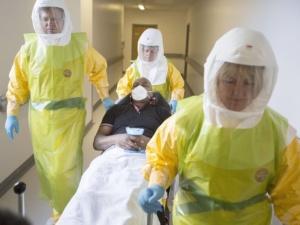The scale of the current Mudslides disaster in Sierra Leone may surpass the Ebola crisis according to health experts. The Government of Sierra Leone has therefore requested international support following the magnitude of the natural disasters that has claimed over 400 lives.

Fears of outbreaks of water borne diseases such as cholera are highly likely, particularly due to lack of access to clean water and sanitation. There is also an acute lack of local capacity to detect and control a disease outbreak, therefore international support is urgently required.
The UK government said in a press release made available to African Voice, Public Health England is deploying a team of health experts to Sierra Leone to help reduce the risk of a disease outbreak following the deadly landslides in Freetown.
The UK-Public Health Rapid Support Team (UK – PHRST), includes experts in tracking the progress of an outbreak (epidemiologists) and diagnosing its cause (microbiologists), as well as a logistician has been deployed.
The team will be working alongside Sierra Leone health system professionals and other experts in disaster relief to support the Sierra Leone government’s response.
UK-PHRST is jointly run by Public Health England and the London School of Hygiene & Tropical Medicine and is funded by the UK government. It continually monitors infectious diseases and other hazards globally, identifying situations where the deployment of specialist expertise could prevent these threats from turning into a global outbreak.
Professor Daniel Bausch, Director of the UK-PHRST said: Sierra Leone is working to stop a tragedy becoming a major public health issue. Our team of specialists will support its health professionals with enhanced surveillance for water-borne diseases, such as cholera, which often appear in the wake of extreme rainfall and flooding. The people of Sierra Leone have shown extraordinary resilience since the Ebola outbreak and we are working alongside them as we tackle this latest disaster together.
Health Minister Philip Dunne said: This disaster is a tragedy for Sierra Leone and I am pleased our new rapid support team is helping to protect lives.
In this first bilateral deployment our specialists will save lives on the ground working with local professionals to prevent disease outbreaks. By assisting to halt the spread of disease at the source, not only do we protect those in Sierra Leone but also citizens across the world, including the UK.
International Development Secretary, Priti Patel said: The UK stands by Sierra Leone in its time of need, stepping up with new emergency support to get food, water and medicine to people who have lost everything.
British expertise is also leading the fight against global health threats ensuring that disease doesn’t take hold in the aftermath of disasters.
The Rapid Support Team is just one way we are helping ensure that countries and the international system are better prepared to effectively tackle the preventable and treatable diseases that still plague countless people today. This will build a safer and healthier world which benefits us all.
As the UK-PHRST’s deployment progresses, it will continue to provide support and share expertise with our partners in Sierra Leone to strengthen the health system beyond the immediate response.
The UK government has remained in Sierra Leone throughout the post-Ebola period, with Public Health England helping to strengthen health systems and further developing the ability to respond to such disasters and prevent outbreaks.
The London School of Hygiene & Tropical Medicine is a world authority in public and global health research, and has been conducting Ebola vaccine trials in Sierra Leone since the outbreak of the virus in West Africa.
Kindly follow us on twitter:@AfricanVoice2










